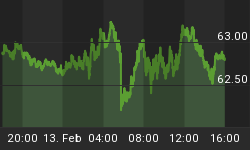Below is an excerpt from a commentary originally posted at www.speculative-investor.com on 26th November 2009.
According to popular opinion, a benefit of inflation is that it reduces the debt burden by reducing the value of the currency in which the debt must be repaid. An associated belief is that when the Fed and other central banks create money out of nothing they are acting to "inflate away" the debt and are thus performing a useful service on behalf of everyone who owes a lot of money. But as is often the case when it comes to central-bank and government manipulations of money and credit, there's a big difference between the way things are commonly portrayed/perceived and the way they are in reality.
If the central bank and the government really wanted to inflate-away the debt then they could do it by handing out money to everyone in proportion to each person's existing holding of money. For example, a 20% increase in the money supply could be effected by giving everyone a dollar for every five dollars they currently held, so someone who previously had a $10,000 savings account would suddenly have $12,000 in their account. Because the new money would be spread throughout the economy in proportion to the original distribution of money, and because everyone would be aware of what was going on, a broad-based increase in prices (a reduction in the purchasing power of money) would quickly follow the money-supply increase. This, we think, would be the least-harmful way to inflate the money supply, and it could actually create a benefit to most debtors (at the expense of most creditors).
However, the primary purpose of monetary inflation is NOT to inflate away the general public's debt. Its purpose is, instead, to help or reward special interest groups with the aim of attaining, or retaining, political power. As we've explained in many earlier commentaries, the new money doesn't get evenly distributed throughout the economy; it enters the economy at discreet points and benefits the first users at the expense of everyone else.
In the US, the government is by far the biggest beneficiary of monetary inflation, followed by the banks. Via the power of inflation, the US government has managed to transfer massive wealth from the rest of the economy to the banking industry over the past 15 months. It was also able to obtain for itself a large slice of the US auto industry, and is now preparing to drastically expand its control over healthcare and energy production/consumption. It's amazing what you can accomplish when you can create, for yourself, an unlimited amount of legal tender.
The money that the government creates for itself via the tool known as the central bank will eventually ripple through the economy and find its way into the bank accounts and wallets of average working men, but by that time living expenses and interest rates will have risen by enough to more than offset any possible 'benefit'. Moreover, the number of working men will be less, because the economic distortions wrought by the monetary inflation will result in greater unemployment.
We aren't offering a free trial subscription at this time, but free samples of our work (excerpts from our regular commentaries) can be viewed at: http://www.speculative-investor.com/new/freesamples.html.
















